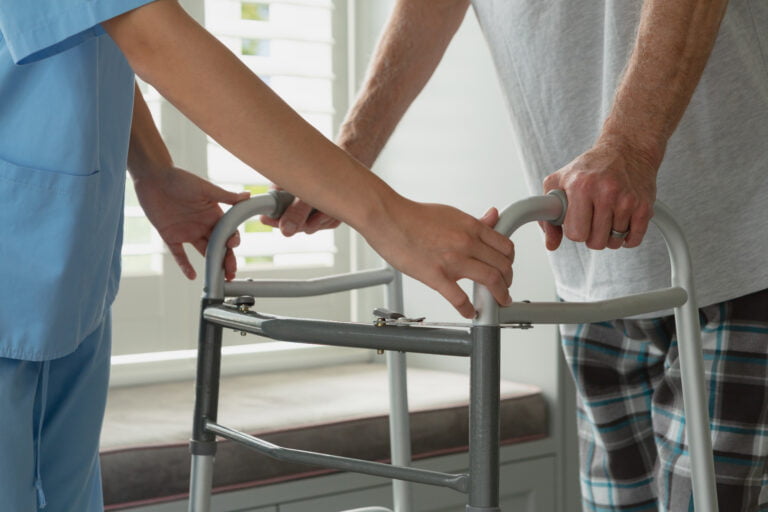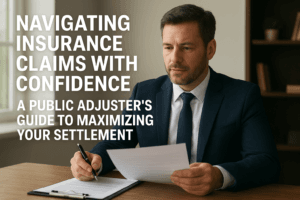Public Adjusting for the Handicapped
As we have said before, we are very proud of the work we do, and helping people. There is nothing more rewarding than helping our clients get the money they are entitled to for damages.
I am often asked by my clients, “Why don’t they just pay my claim? I pay so much for my insurance!” Yes, we hear this question almost every day, and our answer to this question is, “It’s business. Don’t take it personally, because they do this to almost everyone.”
But, we are very proud when we can help out people who are handicapped, especially when we feel they are being taken advantage of or treated unfairly.
Even though we tell our clients that it’s nothing personal and the insurance company is not picking on you, there was one recent case that I thought was different: This was a situation that stood out because our client was handicapped. Physically, he could not handle any part of the claim. He lives in a two-story townhome, but because of his disability, he never goes up his stairs. He only lives in the downstairs area of his house.
This client needed a public adjuster for the disabled on his side.
Public Adjuster for the Disabled
This particular case bothered us very much. We feel that the disabled should be treated with dignity and respect. Moreover, the disabled oftentimes require special accommodations. We see handicap parking, and we see handicap railings and handicap ramps. Doorways are wider to let wheelchairs move easily through. We even see handicapped toilets which are set at a different height. So, there is no question that the disabled require these special accommodations.
We felt that our disabled client was not treated with the needed extra considerations that he should have been. We are a public adjuster for the disabled and this is what happened:
Should Insurance Companies Treat Handicapped People Differently?
One evening, we received a call from our client, Michael. (Name changed to protect his privacy.) So Michael called us up at almost 10pm and said he had water leaking from his upstairs and the water was running down through the floors and ceiling and down his stairs to the bottom floor. The first thing we asked him over the phone was if he could turn off the water or look to see what is actually leaking. He said he couldn’t as he was unable to walk up his stairs without assistance because he was disabled.
Hearing this, we immediately rushed to his house which was about 15 minutes away by car. When we arrived, and came in through his front door, we saw water rushing through the doorway and draining out of his home.
Michael was sitting on the bottom step of his stairs with his phone in his hand, in a very confused and disoriented state. He did not know what to do and he was visibly going through what seemed like an anxiety attack. There was so much water in the house, and the whole house was soaked when we came in through the door. It was a huge mess! When we went upstairs, we tracked the source down to the bathroom where there was a water feed line that had completely disconnected from the toiled tank. Water was shooting everywhere, and we were able to reach behind the toilet and quickly turn off the valve to the toilet.
How did Michael's Insurance Company Respond to his Claim?
Oftentimes, especially when there is a lot of damage, insurance companies will do what is called a recorded statement, and this was no exception. Since he was now our client, I reviewed with him all the possible questions that the insurance company may ask. I told him to answer truthfully and to keep his answers brief, which he did.
One of the questions that he was asked was, what was the first thing you did when you noticed water leaking from the top floor? His answer was, that he didn’t do anything, because he couldn’t walk up the stairs. Although this is the truth, this is not what the insurance company wanted to hear. According to his policy, he is required as a prudent homeowner, to try his best to mitigate the damages, so they don’t get worse. He told the insurance company that the water was running for at least 30 minutes and he didn’t do anything to try and stop the water because he was disabled and could not go up his stairs.
According to the insurance company, his lack of response, when all he had to do was turn off the water, caused substantial damage to his property which could have been prevented.
The Insurance Company did not afford Michael any Consideration for his Disability so what Happened Next?
Well, the next communication by the insurance company was a denial of his claim. We received a letter stating that the extensive damages could have been prevented. They basically blamed the damages on our client and they said it was his fault.
Being an advocate for the disabled, this was a very difficult pill for us to swallow at Florida Allstar Public Adjusting. This was an individual who had recently had one of his hips replaced and was going to rehab and recovering. Michael was getting around with a walker and when he traveled by car, he had a handicap parking permit which he recently renewed with an online company called HandicapDocs.
Since the insurance company took this very tough position, and we couldn’t make any progress speaking to the adjuster and supervisor, we quickly requested a mediation through the Department of Financial Services. This is a process that all property damage claimants are entitled to and there is a description of how it works on your insurance policy. The purpose of mediation is that it aims to keep claims out of the courts.
The mediation was conducted via Zoom. The insurance company had a representative present, Michael was present, Florida Allstar Public Adjusting was present, and there was a mediator present, who was assigned by the FLDFS.
Since we called for the mediation, the mediator gave us the opportunity to present the first argument, and we did. We opened up very strongly discussing Michaels’s disability. We had medical documentation to present including surgical notes and radiology reports. We had Michael on camera with his walker. We displayed his handicap parking permit.
Then, we described all the damage and showed pictures of the stairs, and our estimate for damages, which included additional living expenses.
While we were arguing, we knew we had them, and they knew that if they were going to continue to deny his claim, this would likely escalate into a legal and PR situation, which they decided was not what they wanted to do.
Our estimate was for $89,000 and the claim settled for $81,000 plus an additional $14,500 awarded for his additional living expenses.
.








